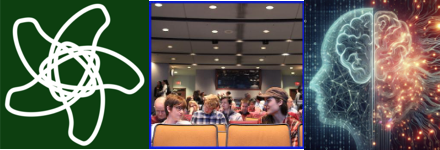Changing the Culture 2025
Topic
The annual Changing the Culture Conference, organized and sponsored by the Pacific Institute for the Mathematical Sciences, brings together mathematicians, mathematics educators and school teachers from all levels to work together towards narrowing the gap between mathematicians and teachers of mathematics, and between those who do and enjoy mathematics and those who think they don't.
Details
The annual Changing the Culture Conference, organized and sponsored by the Pacific Institute for the Mathematical Sciences, brings together mathematicians, mathematics educators and school teachers from all levels to work together towards narrowing the gap between mathematicians and teachers of mathematics, and between those who do and enjoy mathematics and those who think they don't.

Date: Friday, May 16, 2025
Location: SFU-Vancouver at Harbour Centre, 515 W. Hastings Street, Vancouver, Canada
As in past years, registration for this event is free, but we ask you to complete the registration using the button on this page. Please register by Tuesday May 13th.
Conference Program
8:00 Registration, (1301 Harbour Centre Concourse)
8:45 Opening Remarks, (Room 1900 - Fletcher Challenge Theatre)
9:00 Plenary Talk I: Computational Thinking and Mathematical Problem-Solving
Richard Hoshino (Northeastern University (Vancouver))
- slides (pdf)
- handout (pdf)
- What it means to be truly gifted (pdf)
- Lottery Game (ipynb - jupyter notebook)
In the complex world in which we live, our society will benefit from people who can solve challenging problems, in fields as diverse as global health, poverty reduction, economic growth, and climate change. Our students will be able to make significant contributions to society if they can develop and master these four skills: break hard problems into smaller parts, find patterns, extract the most relevant information, and figure out the necessary steps to achieve the desired solution.
These four skills (Decomposition, Pattern Recognition, Abstraction, Algorithm Design) comprise Computational Thinking, which I believe is the most important learning outcome for students in the 21st century. While students can learn Computational Thinking in every course they take in school, they can most effectively grow this mindset in our Mathematics courses, through their analysis of pedagogically-rich problems.
In this plenary talk, we will explore three problems together: a biased lottery, a roommate scheduling puzzle, and a popular children's card game. In the process of solving these three problems, we will uncover the four principles of Computational Thinking and make a surprising connection between these three unrelated problems.
10:00 Coffee Break, (1400 Segal Centre)
10:30 Workshops A and B
Workshop A: When Math Takes You Down the Rabbit Hole (1900 Fletcher Challenge Theatre)
Nora Franzova (Langara)
We will explore how using games, puzzles and open questions attracts us and our students.
Can this help us bridge the gap between the curriculum requirements and good old "fun and games"?
Can we find something at the bottom of the "rabbit hole" where lovely games and puzzles guided us.
Workshops B: Connecting the Dots (1520 Barrick Gold Lecture Room)
Lindsey Daniels (UBC)
We will explore how connections can shape the world around us. From mapping out directions to social networks to solving puzzles, we will discover how mathematics can be used to understand patterns and relationships. How can we use mathematics to “connect the dots”?
12:00 PIMS Award Ceremony: Presentation of the 2025 PIMS Education Prize: Darja Barr (University of Manitoba)
12:15 Lunch (Room 1400, Segal Centre)
13:00 Plenary Talk II: Inspiring an Appreciation for Math in 2025
Trefor Bazett (University of Victoria) [Slides (pdf)]
Does math excite you? Make you anxious? Leave you indifferent? Our students’ perceptions of mathematics—its role in society, and what their role might be within it—are shaped not just by what happens in the classroom, but by the larger cultural forces around them. Let's reflect on these larger forces a bit during this session. I have a dual role as a math professor who also does a lot of math outreach on social media, trying to engage students where they are. This can be a humbling experience, and has led to many lessons that influence my practice back in the classroom. I'll reflect on some of the biggest lessons I've learned about engaging and connecting with students, telling compelling math stories, creating community, and ultimately fostering an appreciation for mathematics.
14:00 Panel Discussion: Outreach and enrichment - activities that serves a larger purpose
- Darja Barr (University of Manitoba)
- Natasha Davidson (Douglas)
- Jane Butterfield (University of Victoria)
15:30 Concluding Remarks